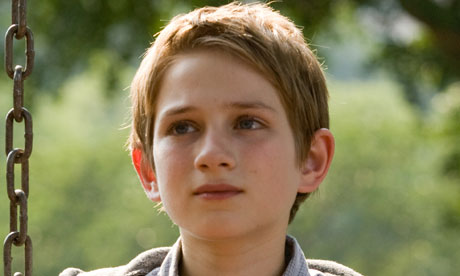
Sometimes cinema poses a question so unsettling that it just won't go away. Extremely Loud & Incredibly Close confronts us with this one: what is it about this film that's so thoroughly revolting?
Not the least challenging aspect of this puzzle is that for many it doesn't exist. Extremely Loud has made the Academy's shortlist for best picture. The Los Angeles Times found the film "eloquent", "polished" and "filled with both sentiment and substance". The Hollywood Reporter suggested that many going to see it would be "emotionally wrenched".
Nonetheless, those who dislike the film dislike it a lot. Less enamoured reviewers have called it "tiresome", "kitsch", "mush", "tacky", irritating, "offensive", "crass" and "colossally misguided". The Guardian's Peter Bradshaw called it "mawkish, precious and bizarre".
Exactly what irks the objectors isn't always pinned down. There are few cavils about the film's execution. Even those who hate Extremely Loud commend its acting, writing and cinematography. It's the underlying concept that seems to evoke the disgust.
A word much used is "manipulative". The film makes it pretty clear what we're supposed to feel, and an emphatic score removes any room for doubt. Yet surely most works of fiction are intended to provoke a preordained response.
Another label that crops up is "exploitative". Extremely Loud dares appropriate pre-existing sentiment provoked by a great public tragedy that many hold to be sacred. However, plenty of films deal in such raw material without provoking protest. No one accused United 93 of "exploiting" 9/11. World Trade Center and Fahrenheit 9/11 may have been less acclaimed, but they weren't considered illegitimate. Nonetheless, there is something about Extremely Loud that does indeed feel dubious.
Why, for example, choose as your representative of the bereaved an 11-year-old cutie with unusual and ill-defined issues? Why have him embark on a peculiarly pointless quest? Why have him clutch an infuriating tambourine, and acquire a weirdo elderly sidekick? Presumably we're supposed to think these things will yield peculiar insights. Yet no such insights actually materialise.
All that young Oskar's mission seems to reveal is that among New Yorkers selected at random heartwarming characters may be encountered. It's not clear why this should dissolve the guilt under which he's been labouring or sort out his troubled relationship with his mom. Sonorous soundbites fail to provide the enlightenment they promise. "If things were easy to find, they wouldn't be worth finding." Why not?
In fact, Extremely Loud invites us to emote about something that isn't actually there. We're not expected to understand anything or empathise with convincing characters. We're merely supposed to enjoy feelings of vague benevolence.
To make this possible, vacuity has been disguised as enigma, and then dressed up with reliable elements plucked from the tear-jerker's toolbox to be deployed for all they're worth. Childhood affliction, motherhood, the father/son bond, the wisdom of the aged, the everyday heartaches of the people, are tossed liberally into a mixing-bowl and expertly whisked. On top of the resulting confection, "9/11" is proudly inscribed in sugar-icing.
The really annoying thing is that to some extent this works. Engulfed in the flurry of schmaltz, it's not hard to surrender to the belief that 9/11 is somehow being given its piteous due. Capably rolled screen tears can beget undeserved audience tears by evoking sorrows unrelated to the matter at hand. A warm bath of emotion is available enough. That some have chosen to wallow in it should hardly come as a surprise. That, after all, is what was intended.
Yet the process is insulting. This is manipulation all right. But manipulation that exploits not just the subject-matter but the sensibilities of the filmgoer as well.
Extremely Loud's director, Stephen Daldry, has played this game before. The Reader was a similarly bogus exercise, also adapted from a popular but phoney book capitalising on historical trauma. That too managed a best picture Oscar nod, and won an Oscar for Kate Winslet. It also did well enough at the global box office.
However, Extremely Loud must expect to make most of its money in the US, and there it has proved something less than a smash. Currently, it occupies the 101st spot among America's most successful films of the past 12 months.
Apparently, you can fool the Academy. You can fool some of the people too. Mercifully, it seems, you can't fool all of the people all of the time.

